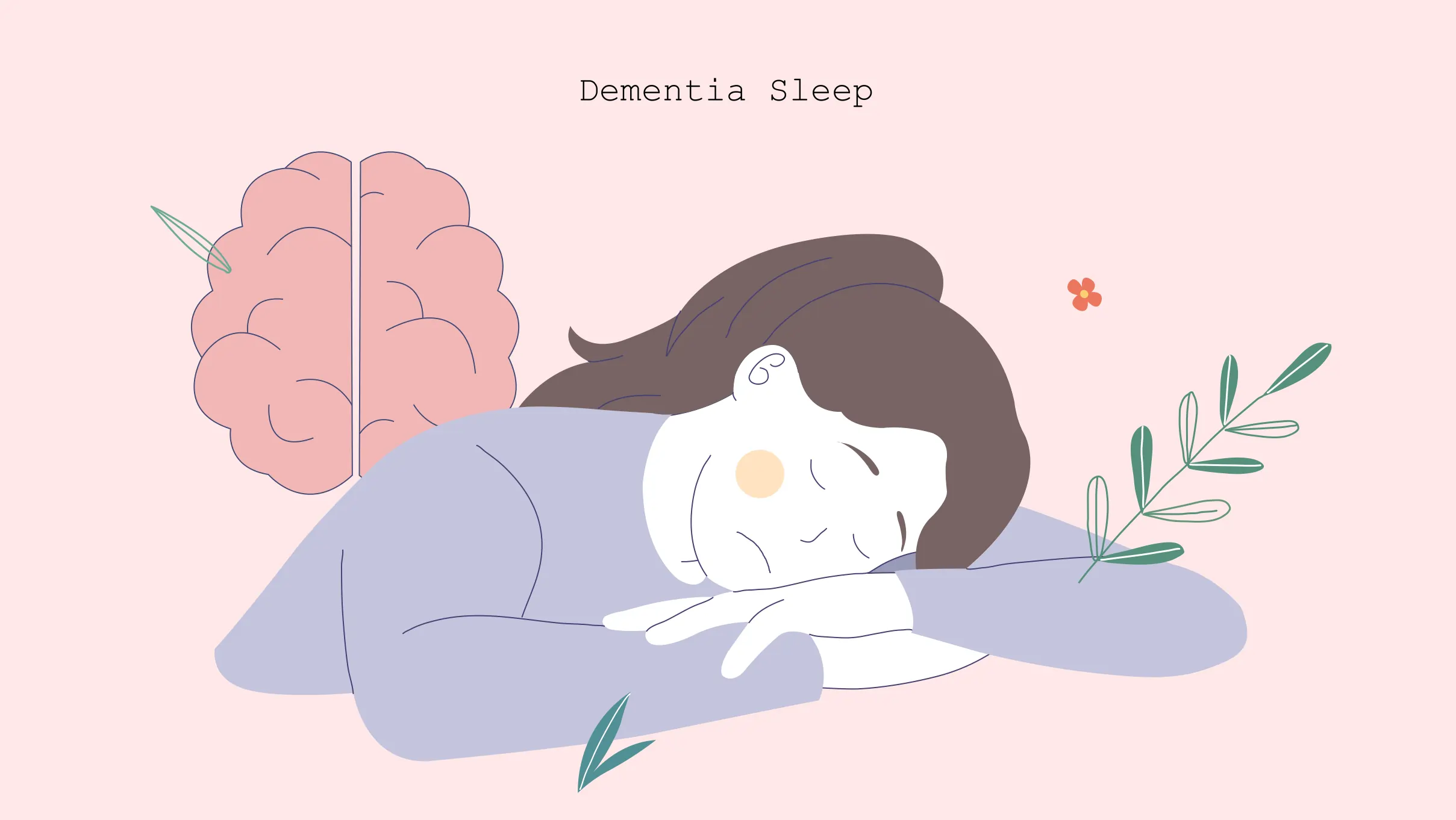Dementia Sleep
Written by


Nobody intentionally wants to feel anxious, agitated, aggressive, and confused. People suffering from dementia experience “sundowning” during nights and evenings. Dementia sleep can be problematic and cause energy drainage from the body. You would not want to wake up exhausted after a long night’s sleep.
Let’s dive deeply into the understanding of dementia to eliminate this problem and sleep better.
How Can We Best Understand Dementia
Dementia is a temporary loss of brain functions that can affect memory, problem-solving, language, and other cognitive processes. Caregivers report disturbed sleep to be one of the worst dementia symptoms. Dementia sleep problems are very common in people suffering from dementia, and sleep loss can boost the severity of other symptoms of dementia.
There isn’t any known cure for dementia, but available treatments can eliminate its side effects.
How Does Dementia Change Sleep Patterns
A collection of physical and psychological processes called circadian rhythm guides our sleep-wake cycle by reacting to our surroundings. People suffering from dementia experience changes in their circadian rhythm, which work against getting quality sleep regularly.
Also, dementia sleep problems can lead to a stressful life in the long term. People suffering from the most common type of dementia will have damaged cells in the Suprachiasmatic Nucleus (SCN). The result of this brain cell damage can cause disturbance of the 24-hour sleep-wake cycle.
Moreover, dementia also affects the changes in sleep structure. Our bodies go through several
sleep stages, from light sleep (Stages 1 and 2) to deep sleep (stage 3 or slow-wave sleep), and then dream sleep (also called rapid eye movement or REM sleep). Dementia sleeping positions also change as this problem becomes critical.
REM sleep and Slow-Wave sleep are critical parts of restoring body-mind coordination.
Sleep Disorders Associated with Dementia
People who have dementia are frequently affected by sleep disorders. Dementia sleep can lead you to a state where you feel low on energy. Here are common sleep disorders associated with dementia:
Restless Legs Syndrome (RLS)
It is a common problem where you have an overwhelming desire to move your legs, especially at night. People suffering from Lewy Body Dementia commonly have this syndrome.
Periodic Limb Movement Disorder (PLMD)
This disorder produces uncontrollable movement of the arms/or legs during the night. It is commonly found that people suffering from PLMD have RLS.
Obstructive Sleep Apnea (OSA)
It is a problem marked by nighttime airway collapse leading to brief lapses in breathing. Insomnia and dementia are correlated in multiple ways. OSA is common with Alzheimer’s disease, occurring in 40% of the patients.
REM Sleep Behavior Disorder
This disorder forces people to act out their dreams, sometimes in unpleasant ways. It is found as the first symptom among people suffering from Lewy Body Dementia.
Depression
Depression is associated with insomnia and other sleep disorders. It is also a mood disorder. It is common in people having dementia, and it is seen at an increasing rate as dementia progresses to more critical stages.
How To Sleep Better With Dementia
If you are suffering from severe dementia issues, then you should consult a doctor immediately. Here are several methods you can follow to get better sleep with dementia.
Maintain A Regular Schedule
Try to sleep and wake up at the same time every day. You should learn to follow a regular schedule to maintain a better sleep cycle.
Limit Naps
Make sure to have quality sleep at one time during the day. Also, you should avoid naps during the daytime to get quality sleep at night. Sleep and Alzheimer’s are co-related among adults.
Engage in Physical Exercise
Engaging in physical activity will make you exhausted and help you to fall asleep easily. Try to do any physical exercise throughout the day.
Schedule Social Activities
It can help you to improve your focus and rearrange your brain cells to get better sleep. Socialising will help you calm and get better sleep.
Add Light Exposure
Add light exposure to your daily routine to eliminate the problems related to dementia sleep.
Avoid Stimulants
Avoid stimulants like coffee and tea at night or before sleeping.
Treat Pain And Sleep Disorders
You can consult a doctor and take proper medications if you have any serious issues related to pain or sleep disorders.
Create a Calming Bedroom Environment
Try to keep your bedroom environment clean and calm by installing pleasant low lights and soundproofing it.
Conclusion
There are multiple ways by which you can easily avoid dementia. You just need to take proper medications and be disciplined in your daily routine. In the worst-case scenario, you can consult a doctor. You may also wonder, “do dementia patients sleep a lot?”. But now you know that it is common for people with dementia to sleep for long periods.
FAQs
At what stage do dementia patients sleep a lot?
The tendency to sleep more and more is a common sign of advanced dementia. A person’s brain suffers more extensive damage as the condition worsens, and they progressively deteriorate and become frailer.
What helps dementia patients sleep at night?
Melatonin may aid those with dementia in getting a better night’s sleep and delaying sunset. Ensure adequate lighting. Evening bright light therapy helps decrease dementia patients’ sleep-wake cycle disruptions. The anxiousness that can occur at night when the surroundings are dark can also be decreased with enough lighting.
Should you let a dementia patient sleep?
The person with dementia may feel better, be less confused, have better coordination, and have more energy during the day by having a regular sleep schedule.
people like this article
Written by








